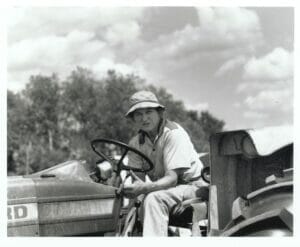
Vermont farmer Gert Lepine on a tractor. Photo Courtesy Vermont Folklife.
Presentations and Workshops are planned throughout the spring and summer. Check back here for updates and new offerings.
Monday, August 21, 2023 | Barre, Vermont at the Vermont History Center
Vermont’s agricultural identity is one of its most enduring narratives. It is also a complex story as told through the people who shape local food systems. How can oral history and folklife collections invite deeper exploration of these life experiences and different perspectives? Join Vermont Folklife to discover ways to learn from folklife and ethnographic materials and feature them as key primary sources about local culture, memory and meaning.
This workshop will present the benefits of audio-visual learning modalities and communication styles. Oral history and other ethnographic records include a wide range of documentation of people and traditions, from historic photographs, memorabilia and art, recipes and song books. These unique primary sources complement inquiry-based pedagogy that encourages curiosity about community life through topics such as occupational folklife of farmers–narratives that communicate the traditions, values and dilemmas of work life. The primary source sets and learning activities offer a dynamic entry point into folklife and ethnography as an approach for elevating multiple, diverse perspectives and expressions of Vermont life and culture.
Previous workshops:
May 6, 2023 | Burlington, VT at the DoubleTree Hilton
A presentation for We All Belong: Vermont Statewide Conference on the Education of Immigrant and Refugee Students, K-12
How do audio recordings from folklife collections elevate everyday life as a valuable source of knowledge? This session will introduce the kinds of cultural documentation included at Vermont Folklife’s Archive and focus on archival sound as a unique type of primary source. Participants will hear a selection of interview excerpts focused on Vermont farming and foodways, part of Teaching with Folk Sources, a Library of Congress Teaching with Primary Sources project. The session will also offer activities and resources that encourage the use of oral history interviews, both as a record and as part of critical inquiry for learners of all ages.
